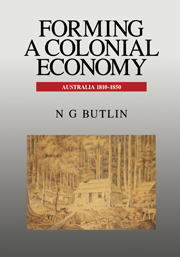Book contents
- Frontmatter
- Contents
- List of Tables
- List of Figures
- Acknowledgements
- Part I Forming an Economy
- Part II The Colonial Peopling of Australia: 1788–1850
- Part III Public Funding of Colonial Development: 1788–1850
- 5 Introduction
- 6 British Fiscal Characteristics
- 7 The Imperial Fisc in NSW and Van Diemen's Land to 1821
- 8 Broad Relations between British and Australian Fiscs to 1821
- 9 The Beginning of Local Budgeting: Real and Subterranean Budgets
- 10 The Conventional Legal Fisc in NSW: 1822–50
- Part IV The Colonial Australian Economy 1810–1840—A Historical, Statistical and Analytical Account
- Bibliography
- Appendixes
- Index
9 - The Beginning of Local Budgeting: Real and Subterranean Budgets
from Part III - Public Funding of Colonial Development: 1788–1850
Published online by Cambridge University Press: 04 August 2010
- Frontmatter
- Contents
- List of Tables
- List of Figures
- Acknowledgements
- Part I Forming an Economy
- Part II The Colonial Peopling of Australia: 1788–1850
- Part III Public Funding of Colonial Development: 1788–1850
- 5 Introduction
- 6 British Fiscal Characteristics
- 7 The Imperial Fisc in NSW and Van Diemen's Land to 1821
- 8 Broad Relations between British and Australian Fiscs to 1821
- 9 The Beginning of Local Budgeting: Real and Subterranean Budgets
- 10 The Conventional Legal Fisc in NSW: 1822–50
- Part IV The Colonial Australian Economy 1810–1840—A Historical, Statistical and Analytical Account
- Bibliography
- Appendixes
- Index
Summary
Real Budgeting within the Penal System
New South Wales was never a gaol in a literal sense. Nevertheless, the first local budgetary act began in NSW when the first fish were caught and shared and the first corn produced, stored and distributed. In the first settlement years, unfree labour, working under direction, was under pressure to provide a range of immediately needed goods and services. These included the catching, collection and ultimately the production of food, the assembly of local materials for buildings and other structures, the clearing of land and the distribution of goods supplied by Britain.
To support these activities, official ration allocations of food and clothing were organised through the Commissariat as recipient of British supplies and local output. As receiver, storer and distributor, the Commissariat became a Treasury in kind. Through it emerged a rudimentary fiscal process in real goods and services. Virtually from the beginning, the convict colony was operating a local fisc that can be obscured if one thinks merely in terms of productive and distributive activities. Moreover, the real fiscal operations were relatively complex, depending on the precise equality of rations, variance in the efficiency of different convict groups and the variety of activities in which convicts were engaged. As convicts were assigned for personal use, particularly after 1792, the central fiscal role of the commissariat began to disintegrate.
- Type
- Chapter
- Information
- Forming a Colonial EconomyAustralia 1810–1850, pp. 71 - 81Publisher: Cambridge University PressPrint publication year: 1994



